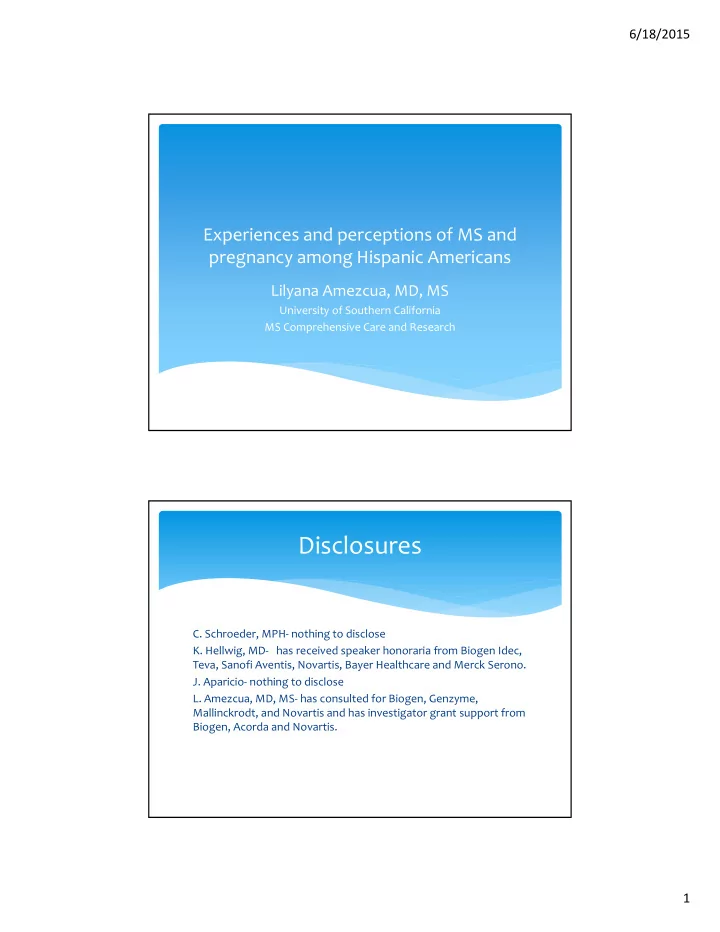

6/18/2015 Experiences and perceptions of MS and pregnancy among Hispanic Americans Lilyana Amezcua, MD, MS University of Southern California MS Comprehensive Care and Research Disclosures C. Schroeder, MPH ‐ nothing to disclose K. Hellwig, MD ‐ has received speaker honoraria from Biogen Idec, Teva, Sanofi Aventis, Novartis, Bayer Healthcare and Merck Serono. J. Aparicio ‐ nothing to disclose L. Amezcua, MD, MS ‐ has consulted for Biogen, Genzyme, Mallinckrodt, and Novartis and has investigator grant support from Biogen, Acorda and Novartis. 1
6/18/2015 Background Multiple sclerosis (MS) is an immunomediated demyelinating disease of • the central nervous system gender ratio (female/male) varying from 2:1 to 3:1 1 • MS frequently affects women and in fertile age 2 • During pregnancy, a complex modulation of immune responses takes • place 2 This immunological balance seems to positively influence the short ‐ term • course of MS, 3 a reduction in relapse rate during pregnancy(third trimester) • a 3 x relapse increase during the first trimester after delivery 4,5 • Recent data suggests pregnancy after MS onset may also be associated • with a slower long ‐ term disability progression. 6 1. Koch ‐ Henriksen N, et al Lancet Neurol 2010; 9: 520–532. 2. Houtchens MK. Pregnancy and MS. Semin Neurol 2007; 27: 434–441. 3. Ostensen M, et al Semin Immunopathol 2007; 29: 185–191. 4.Confavreux Cet al. Rate of pregnancy ‐ related relapse in multiple sclerosis.. N Engl J Med 1998; 339: 285–291. 5. Vukusic S, et al. Pregnancy and multiple sclerosis (the PRIMS study): clinical predictors of post ‐ partum relapse. Brain 2004; 127 (Pt 6): 1353–1360. 6. Masera et a.l Parity is associated with a longer time to reach irreversible disability milestones in women with multiple sclerosis. Mult Scler. 2014 Dec 22. pii: 1352458514561907. Hispanics and Pregnancy • Half of pregnancies in the United States are unintended, with the highest proportions occurring among minority populations: • African American and Hispanics • Common practices among Hispanics: • Higher fertility rate (2.4 vs. whites 1.8) 1 • Start at earlier age (birth peaks in 20s vs. white 30s) 2 • prevalence of breastfeeding • whites (74.0–76.4%) and Hispanics (73.6–81.9) 2 1. Pew research center Social & Demographic Trends 2. Progress in Increasing Breastfeeding and Reducing Racial/Ethnic Differences — United States, 2000–2008 Births 2
6/18/2015 Hispanics with MS General lack of adequate education and understanding about MS, • known resources, and realistic expectations about treatments among Hispanic Americans with MS 1 Less is known of the experience and perceptions of pregnancy in • Hispanics with multiple sclerosis. We sought to explore women's experiences of pregnancy with MS • to help make recommendations for care. Shabas D, Heffner M. Multiple sclerosis management for low ‐ income minorities. Mult Scler 2005;11: 635–640 Methods • We conducted a qualitative study in a total of 37 Hispanic women with MS living in the greater Los Angeles area. • 30 had successful pregnancy experience. • Marital status, education, experiences and perceptions of MS during and after pregnancy were recorded using semi ‐ structured telephone interviews. • Breastfeeding practice was also recorded • The participants also rated their perceived severity of MS on a scale of 0 ‐ 5 with higher number indicating greater severity. 3
6/18/2015 Demographics Perception of pregnancy with MS The most commonly reported concerns were: fear of passing MS to their kids (15%) fear of relapsing or worsening of MS (10%) being scared in general (10%) These women also expressed concerns regarding their physical limitations and the resulting burden on family members. 4
6/18/2015 Perceived MS symptoms during pregnancy (n=26) Eight women (27%) believed that pregnancy + influenced the MS symptoms Eight women (27%) did not About 30% (n=10) of the women believed that pregnancy negatively affected their MS symptoms 5
6/18/2015 Relapse perception during pregnancy On a scale of 0 to 5, the mean level of perceived severity of MS was 3.2 6
6/18/2015 Breastfeeding Practice The mean duration of breastfeeding was 16 weeks (66%, n=20) There was no statistically significant association between breastfeeding and reported improvement ( P =1.00) or worsening of MS symptoms post ‐ partum 1st pregnancy ( P =0.42) In 10%, the preconception of MS transmission through their breast milk prompted a fear of whether or not to continue breastfeeding. Conclusions 1/3 of Hispanic females with MS had a poor perception of Pregnancy Perceptions of postpartum and relapse during that time are under review Breastfeeding practice was seen in 66% (below National expected practice) Recommendations for MS care Pregnancy in the setting of MS needs to be discussed Breastfeeding should also be part of the discussion Further research is necessary to identify factors that influence these perceptions and investigate how they may differ from AA and whites 7
6/18/2015 Acknowledgement Christopher Schroeder, MPH 1 Kerstin Hellwig, MD 2 Jose Aparicio, CCRP 1 Lilyana Amezcua, MD, MS 1 (1)Neurology, University of Southern California, Los Angeles, CA (2)Neurology, Ruhr University Bochum, Bochum, Germany 8
Recommend
More recommend